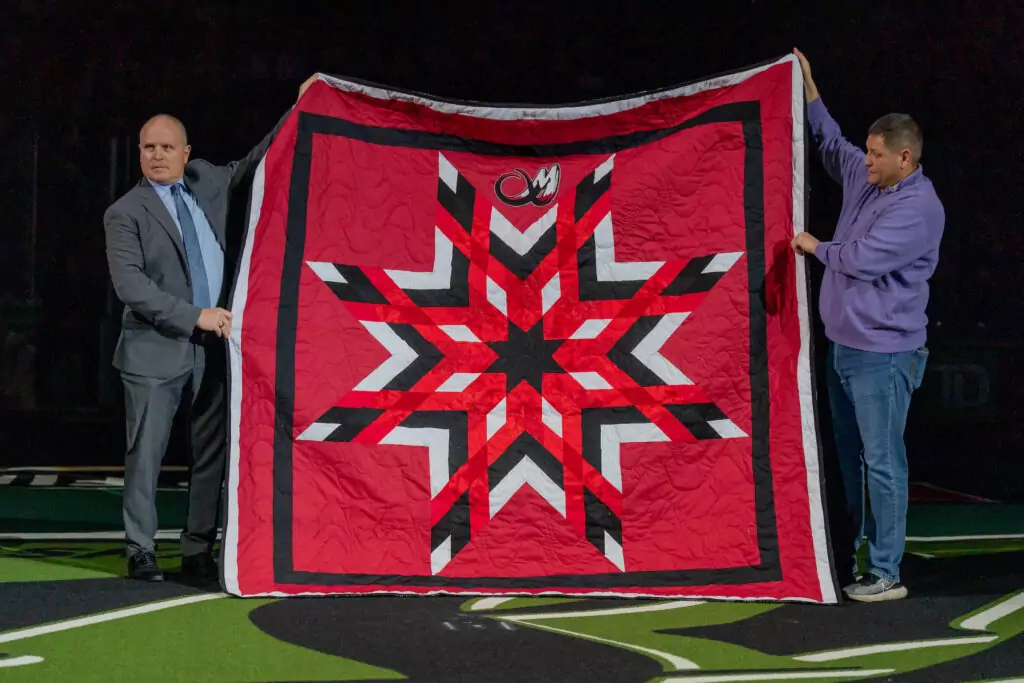
Lacrosse and Indigenous peoples. A blanket ceremony and land acknowledgement. Respect and reconciliation.
These star-crossed connections can be found at every Saskatchewan Rush home game this season.
“Being part of an organization like the Rush that shows respect and a move towards reconciliation with First Nations and Indigenous peoples is great,” says Rush forward Marshall Powless who is from Oshweken, a Six Nations community in southern Ontario.
It started with Saskatchewan’s past Indigenous players and the NLL team’s initial involvement with local First Nations in 2016 when the franchise moved to Saskatoon from Edmonton.
It continued last season when the Rush introduced a pregame land acknowledgment of Treaty 6 territory and the league launched its first Every Child Matters campaign as part of the NLL Unites initiative.
“I love that they acknowledge the land that we are fortunate enough to play the game of lacrosse on and to hopefully educate at least one person in the stands who may not have known prior to attending a game,” Powless says.
And it continues in 2022-23 with a pregame star blanket ceremony, unveiled by Saskatchewan before its home opener against Colorado on Dec. 3., and the team’s continued interaction with local First Nations and Indigenous peoples.
The star blanket is presented by Rush General Manager Derek Keenan and Saskatoon Tribal Council Chief Mark Arcand to the visiting coach at centre floor of Co-op Field at SaskTel Centre. The blanket, in opposing team colours and with their logo, is wrapped around the coach as a symbol of respect and welcoming from local Indigenous peoples.
“It’s a great honour to participate in the star blanket ceremony,” says Keenan. “There’s a real feeling of community and healing during the presentation.
“For me personally it’s tremendous to be part of it. From day one in Saskatchewan, the Rush have put a major emphasis on recognizing [local] Indigenous culture and this has been enhanced with the blanket ceremony.”
The star blanket is also used to honour, protect and celebrate one’s achievements. Each blanket is unique but they all have a star image at the centre, which represents the Creator’s eye.
“The blanket ceremony is heartwarming,” says Powless. “It’s crafted by an Indigenous person and when the receiver gets their blanket, they will always reflect back to our people, First Nations and Indigenous, and [that] hopefully lights an interest to learn more about who we are.”
There have been three star blanket ceremonies so far this season: Dec. 3 against Colorado, Dec. 31 versus Panther City and last week when Saskatchewan hosted Las Vegas.
The eye-catching blankets have ranged in colour from Mammoth red and black to PCLC purple with red accents to Desert Dogs black and white.
“I think prior to the Rush moving to Saskatchewan there wasn’t a big lacrosse presence within the Indigenous communities,” Keenan says. “But that has changed thanks to the work of Chief Arcand and former and current Rush players Jeremy Thompson, Jeff Shattler and Marshall Powless.”
Another special colour appeared last week on the green-clad Rush: Orange Every Child Matters warmup shirts and helmet decals as part of the NLL’s second league-wide campaign to create awareness around the forcible placement of Indigenous children into residential and boarding schools in Canada and the U.S.
“I can’t think of anything more important than the Rush’s involvement in Every Child Matters,” says Keenan. “This is our opportunity to show support and compassion for the people who gave us this great game.
“I think it’s incumbent upon us as stewards of the game to better understand what happened and to help in ensuring atrocities like this never, ever occur again. I think we can play a major role in the reconciliation process.”
According to Keenan, the key to reconciliation is communication.
“We’ve been fortunate to have some very good Indigenous players on the Rush roster over the years,” Keenan says. “I’ve found the most important thing we can do is communicate with them and learn from them.
“For me personally I have found many of my conversations with our Indigenous players fascinating, in particular with Jeremy Thompson. I learned more from him about the game and their culture in my conversations with him than I ever had before.”
Powless agrees with his GM.
“It is super important to have the Rush be a part of the NLL’s Every Child Matters campaign,” says Powless. “We need to shed more light on the impacts residential schools have left on Indigenous people and the only way to do that is to continue talking about it. We need to continue to honour the survivors, the families and the children who were never able to come back home.
“Having Every Child Matters intertwined with lacrosse, It’s imperative to have it. This is the sport Indigenous people created, this is the game people associate Indigenous people with.”
Lacrosse, the Creator’s Game and the Medicine Game.
“I am proud to be Haudenosaunee and to be able to educate generations to come,” Powless says. “The connection from our people to the Creator’s Game is so important, we still practice the Medicine Game through our communities. However, the game of lacrosse that we play now is a modernized version of the Medicine Game.”
Star blankets, respect and reconciliation.
“I’m glad the game of lacrosse is growing and is able to be connected to our people,” says Powless, “so it sparks a conversation on who we are, the battles we had to overcome and how much we evolved to be where we are today.”